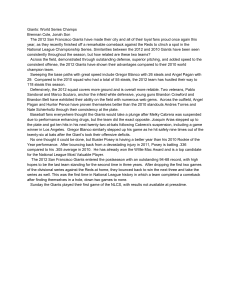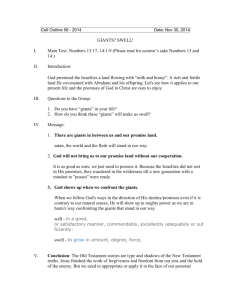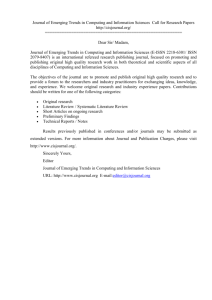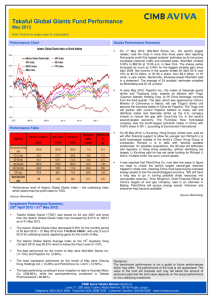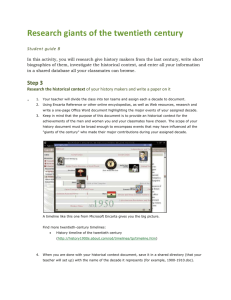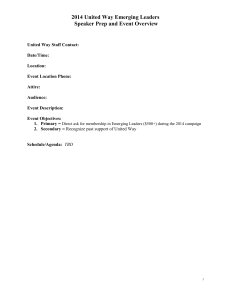The 6 characteristics that give Emerging Giants an edge. And
advertisement
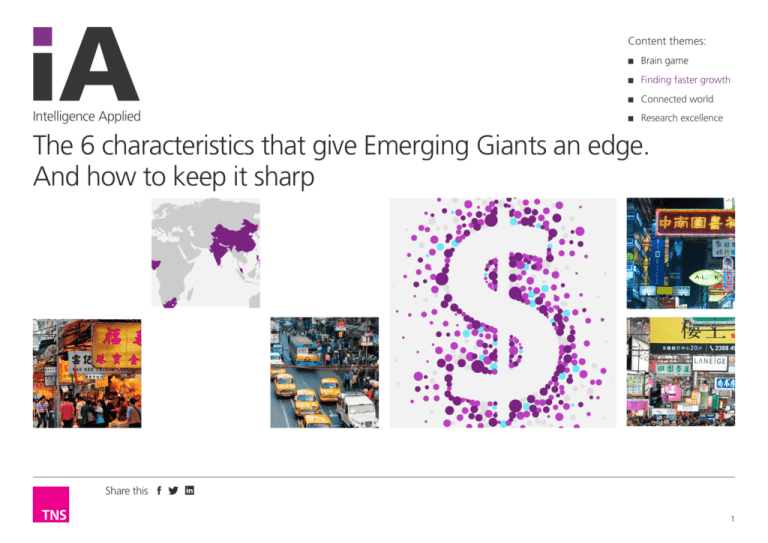
Content themes: Intelligence Applied ■■ Brain game ■■ Finding faster growth ■■ Connected world ■■ Research excellence The 6 characteristics that give Emerging Giants an edge. And how to keep it sharp Share this 1 The 6 characteristics that give Emerging Giants an edge. And how to keep it sharp Once they were winners only on home soil, largely unknown outside of the emerging markets that they dominated. Share this Intelligence Applied 2 The 6 characteristics that give Emerging Giants an edge. And how to keep it sharp Today, giant companies from rapid-growth economies are transforming the make-up of global business. Companies based in emerging markets already account for 26 per cent of the Fortune Global 500; by 2025, according to McKinsey, they will make up almost half of it. China alone boasts 89 companies in the Fortune 500, and three of Forbes magazine’s most innovative businesses on earth in the shape of Baidu, Henan Shuanghui Investment & Development and Tencent Holdings, which might itself be unfair to Huawei, Haier and Lenovo. From India there’s Tata Group, Mahindra, Marico and Bharti, The Philippines has Unilab, and that’s before we get to Malaysia, Nigeria, South Africa and more. 26% Fortune Global 500 companies based in emerging markets Share this It’s been tempting for some to put the rapid rise of these emerging giants down to one simple factor: heavyweight government backing that enables them to buy their way to global scale whilst happily writing off any risks that don’t work out. But while it’s true that their ownership structures have shaped the giants’ approach to finding growth, it is a serious misjudgment to assume that it is the only reason for that growth. We look at the six characteristics that have powered the success of emerging giants – and how they can ensure these traits remain a huge competitive advantage. Three of Forbes magazine’s most innovative businesses on earth are from China Closer analysis reveals that emerging giants have far more in common than government money. Their success comes from decisive yet open-minded corporate cultures that are fuelled by unique market understanding and a precision approach to identifying and acting on opportunities. The greatest challenge that these companies face is replicating the success they have enjoyed to date across a broader variety of global markets – but intelligent use of research can enable them to do exactly that. Intelligence Applied 3 The 6 characteristics that give Emerging Giants an edge. And how to keep it sharp Finding opportunity amid chaos and uncertainty Solid infrastructure, dependable distribution and supportive regulation: emerging giants often grow up in markets where none of this can be taken for granted. They’ve achieved success by being street smart, adapting to changing circumstance and filling gaps in the market as quickly as they appear. They know that distribution can be everything, and that a brand’s profile and success often depend on how visible and accessible it is on the shelf. They’ve evolved rock-solid relationships with retailers of all shapes and sizes to deliver that distribution – and through those relationships they’ve evolved an intimate understanding of their markets. Emerging giants don’t just understand the concept of Power in the Market1; they live and breathe it. And this equips them superbly for the challenges and opportunities of rapid-growth economies in other regions. Bharti and Orascom have proved highly successful at exporting their distribution expertise to Africa, for example. As economic uncertainty grows in previously stable markets such as those of Southern Europe, their ability to spot opportunity in unlikely places could prove equally invaluable there Share this too. And research repeatedly shows that distribution and product availability can exert similarly powerful influence over brand growth in developed markets. The key to emerging giants’ future success is how quickly they can build up a detailed picture of other dynamic markets to match their knowledge of their home turfs. Insight on local needs – and improvisation to meet them Partly because they are less tied to dominant hero products, emerging giants have frequently outperformed established multinationals when it comes to innovating to meet local needs. As a homegrown brand, Jollibee has proven that it understands the Fillipino palette far better than McDonalds; Kung Fu Catering is taking similar bites out of the same brand in China. Meanwhile FlipKart has built a $1 billion ecommerce business in India by quickly grasping the local need for cash on delivery. There is no reason why the new giants should lose this grasp of cultural nuance once they move into new markets – but to export it successfully they need consumer insights that can build up a picture of emotional and functional needs for those markets. Intelligence Applied 4 The 6 characteristics that give Emerging Giants an edge. And how to keep it sharp Launch and learn. The license to speculate Today’s local giants have perfected the art of launching and learning, going to market with products that they believe have a high probability of success, and then acting rapidly to improve, optimise, or simply withdraw and replace them. There is little appetite for delaying launches to finetune them, or second-guess how the market will respond; better to get the product out there and let experience show what needs fixing. A lack of public ownership and freedom from investor scrutiny may be partly responsible for this license to speculate, but emerging giants use it with panache – and to great effect. As they expand, they will require research that reflects this mindset: insight that focuses on understanding the consumer landscape and identifying the spaces most worth exploring; and less on sizing opportunities in detail and proving their value ahead of launch. Once a new product is launched, they will need rapid insight on whether customer experience matches its promise, and actionable recommendations on how to optimise to ensure that they do. Share this Today’s local giants have perfected the art of launching and learning, going to market with products that they believe have a high probability of success, and then acting rapidly to improve, optimise, or simply withdraw and replace them. Intelligence Applied 5 The 6 characteristics that give Emerging Giants an edge. And how to keep it sharp Identifying entry points precisely Contrary to some popular perceptions, emerging giants often don’t try to dominate markets from the outset. They know that they can start small, focus on their strengths and then expand their footprints from there. In developed markets, this entry point often takes the form of a price-sensitive segment whose needs are not being met. Compact, low-cost refrigerators gave Haier an entry point into the US market from which it could expand; Samsung first made a name for its brand in developed markets by focusing on printers before moving onto laptops. Identifying a market’s unmet needs can hold the key to giants establishing a foothold for their brands in even the most competitive landscape. Entrepreneurial cultures Western multinationals have found themselves struggling to recruit top talent in markets such as China – and with good reason. Graduates know that they are far more likely to be given freedom to make their mark in home-grown giants – and they know they are far less likely to be judged on a single Share this quarter’s performance as well. Emerging giants need to ensure that they retain this entrepreneurial culture as their workforce expands and more mature markets suggest different measures of success, and this means maintaining a longer-term view of brand value and performance. Acquiring for access and not for efficiencies Emerging giants often take an acquisition-led approach to developed markets, but they are typically extremely precise about the purpose of their acquisitions: buying to gain access to customers rather than to create economies or efficiencies by taking over the running of a business. Tata Group’s acquisitions of Jaguar, Land Rover and Tetley Tea is a prime example: it has established a strong foothold for its Motors and Tea businesses both in the UK and across the world, and it has confounded critics by leaving the day-to-day running of the companies to existing management in the brands’ home market. In Africa, Tiger Brands has taken a similar approach to meeting the infrastructure challenges of markets to which it expands from its South African base. As emerging giants seek to expand to markets further from their heartlands, a full understanding of the strength of each prospective acquisition becomes vital. When customers are the core value that you are seeking to acquire, understanding the strength of customer relationships in the competitive context should be a key focus for due diligence. Better intelligence about companies’ strength can only increase the success rate of emerging giants’ acquisitions. Tata Group’s acquisitions have established a strong foothold for its Motors and Tea businesses both in the UK and across the world Intelligence Applied 6 The 6 characteristics that give Emerging Giants an edge. And how to keep it sharp Learning from the new giants on the block Once upon a time, huge multinational companies all looked much the same: publicly owned businesses with a common approach to management culture, decisionmaking and growth strategies. The emergence of this new generation of giants is shaking things up by proving that there are new ways to achieve global expansion whilst still holding true to core principles around innovation, local market understanding and precision thinking. There is little reason to expect that emerging giants’ approach to global markets will change as they grow. Indeed, in their expertise at learning by doing and rapid optimisation there is so much more for established businesses to learn. Share this Intelligence Applied 7 The 6 characteristics that give Emerging Giants an edge. And how to keep it sharp About the authors References You may be interested in... Nitin Nishandar is the Regional Managing Director for the Brand & Communication practice in Asia Pacific. Nitin has 18 years research industry experience and has been with TNs for 12 years. Nitin has worked with clients in markets including Egypt, India, Taiwan and Thailand before moving to Singapore. McKinsey Global Institute, Urban world: The shifting global business landscape, October 2013 What it takes to be an Irresistible brand > As Head of Brand & Communication, Asia Pacific, Nitin leads a team of experts across the region as they advise clients on strengthening their brands, increasing the effectiveness of communications campaigns and ultimately, driving sales. Nitin works on diverse group of clients in finance, automotive, technology and FMCG clients. He has published white papers on advertising, media and is often quoted in media on his views on brands and communications in emerging markets. Share this Forbes, The world’s most innovative companies > Power in the Mind is TNS’ measure of emotional connection or psychological attachment. It is a purely attitudinal measure, and reflects the way an individual feels about a brand. Validations show that this psychological attachment translates into in-market decisions and brand performance. 1 I eat therefore I am > Laying the foundations in Cameroon > Intelligence Applied 8 About Intelligence Applied Intelligence Applied is the home of the latest thinking from TNS, where we discuss the issues impacting our clients, explore what makes people tick and spotlight how these insights can create opportunities for business growth. Please visit www.tnsglobal.com/intelligence-applied for more information. About TNS TNS advises clients on specific growth strategies around new market entry, innovation, brand switching and stakeholder management, based on long-established expertise and market-leading solutions. With a presence in over 80 countries, TNS has more conversations with the world’s consumers than anyone else and understands individual human behaviours and attitudes across every cultural, economic and political region of the world. TNS is part of Kantar, the data investment management division of WPP and one of the world’s largest insight, information and consultancy groups. Please visit www.tnsglobal.com for more information. Get in touch If you would like to talk to us about anything you have read in this report, please get in touch via enquiries@tnsglobal.com or via Twitter @tns_global Share this Intelligence Applied 9
